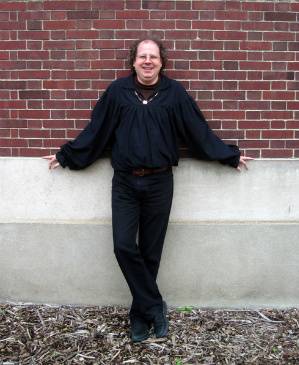 Ian Phanes, an employee of the University of Illinois Library, appears to be average enough, as does his two-bedroom apartment in Urbana. The living room could be considered somewhat sparse, but it is orderly and comfortable. Two large bookshelves rest against one wall, nothing unusual, given his career. However, a list of the titles of the books is where the “average” description ends. Nearly all of them are titles involving the occult, the supernatural, or paganism. Self-help books, encyclopedia, and literature fill the shelves. Oh, and the second bedroom? It’s a complete ritual room.
Ian Phanes, an employee of the University of Illinois Library, appears to be average enough, as does his two-bedroom apartment in Urbana. The living room could be considered somewhat sparse, but it is orderly and comfortable. Two large bookshelves rest against one wall, nothing unusual, given his career. However, a list of the titles of the books is where the “average” description ends. Nearly all of them are titles involving the occult, the supernatural, or paganism. Self-help books, encyclopedia, and literature fill the shelves. Oh, and the second bedroom? It’s a complete ritual room.
Phanes has been a pagan since he was 21. Since then, he has worked to help establish the pagan community in the area, and has integrated himself as a teacher, helper, and leader. “I pretty much started the pagan community here,” he said:
I’m the one who started networking across groups, and the groups are not all that old. I’ve been actively creating the pagan community. Since I was committed to paganism, some of the people I was networking with were pagan. That was when it was hard to be pagan and find pagans.
In the late 80s, there were a very small number of pagan groups within the Champaign-Urbana area. By getting the groups to meet with and speak to each other, Phanes was able to help establish a network of pagans within the area:
I wasn’t even aware of what I was doing. I just started introducing people. We were young and naïve enough to think that we could all do things together. That, of course, didn’t really work. When you start expanding from 50 people to 100, it changes the dynamic.
One of the groups that eventually formed was Pagans Night Out, or PNO, a monthly social for those who are pagan or pagan friendly to meet and socialize with each other. Even though he didn’t have a hand in forming it, he eventually became a co-coordinator for it for five years.
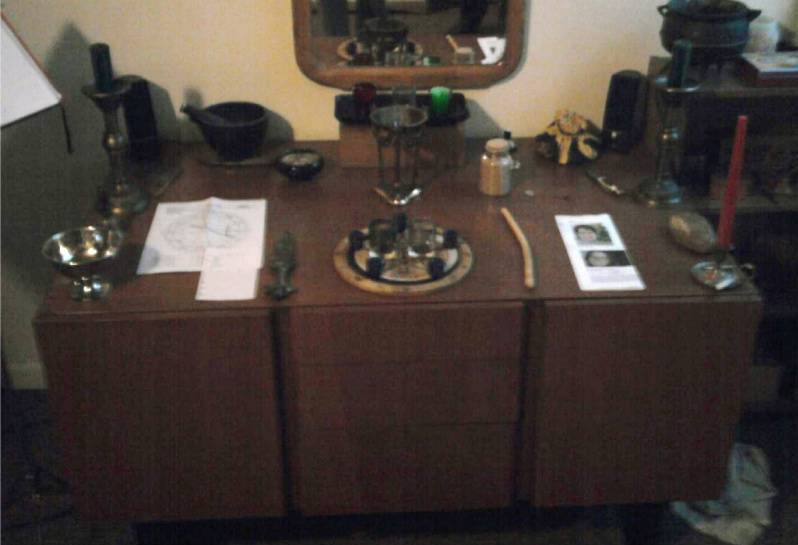
However, it was through PNO that he realized that the community was missing something important. While pagans may have had the opportunity to socialize informally with each other, there wasn’t the option of performing group rituals together. “There was interest in having some rituals, and I decided that I was willing to host an at-hoc ritual at my place,” said Phanes:
This group was originally connected to PNO, which is always the thirteenth of the month. When it was Friday the thirteenth, after PNO, we’d come back to my place to do rituals. Later, discussion came up that people wanted more public ritual and structure.
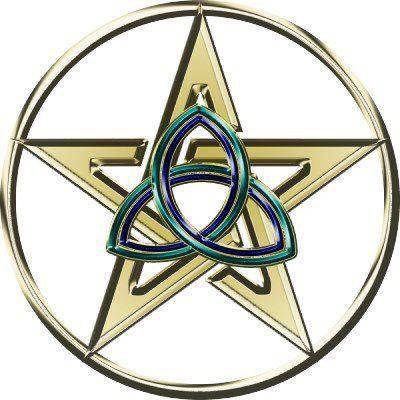 This group is now known as the CU Pagan Ritual Team. At just over a year-and-a-half-old, they have already completed two public rituals, the second which was to the goddess Hekate, the Greek goddess of magic, witchcraft, and night.
This group is now known as the CU Pagan Ritual Team. At just over a year-and-a-half-old, they have already completed two public rituals, the second which was to the goddess Hekate, the Greek goddess of magic, witchcraft, and night.
There are two people that are business organizers for the ritual team. The structure of the team shifts around quite a bit. This is so that everyone gets the opportunity to contribute in those positions, and so that it doesn’t become a burden for people. This is also to avoid fights and ensure that no one makes a claim for power over the group. With a rotating leadership, the team is able to avoid a hierarchical situation.
Members meet every few weeks to discuss the research that they have done and what elements should be included for the ritual. It is an extremely lengthy process that takes months. Phanes hopes that they will eventually be able to do four or five public rituals a year, although that is a long ways off. “Public ritual is work,” he said, “Like any event, it is a public event. There’s a lot of prep work done by a bunch of people. It’s more than just show up that night and do work.”
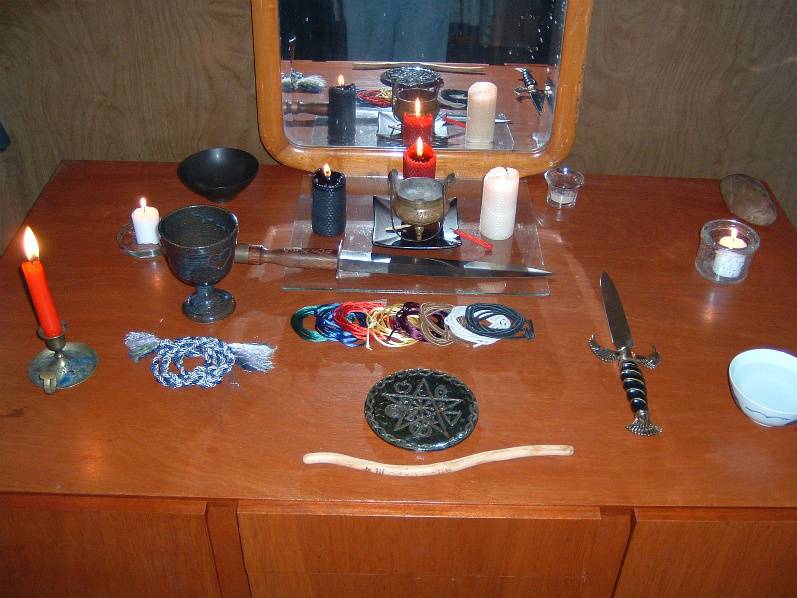
Imbolc altar
The creation of the team was essentially inevitable given not only the demands of the people who requested it, but also the desire for Phanes to teach. He explained that in his mind, when it comes to his role in the community, he is meant to be a teacher. In regards to the ritual team, it was an opportunity for him to show people what group ritual would be like and, more importantly, what a good group ritual would be like:
That’s kind of my nature. It’s what I do. Why do I do divination at Psychic Fairs? I show people that there is more to tarot. I’ve done intro classes to stone reading at Beads N Botanicals. It’s always been my role in the community.
Beads N Botanicals, a local new age shop, offers classes in various topics of the occult and others to its customers. Phanes has been asked to teach classes there on several occasions, and continues to do so. One of his first classes was an introduction to stone reading:
I talked about how you need to develop your own stone set. I gave them the basic info and explained what the person’s head space should be and how to apply it to a bag of rocks. I also, let them know what is the sort of head space [they] need to be in to do divination.
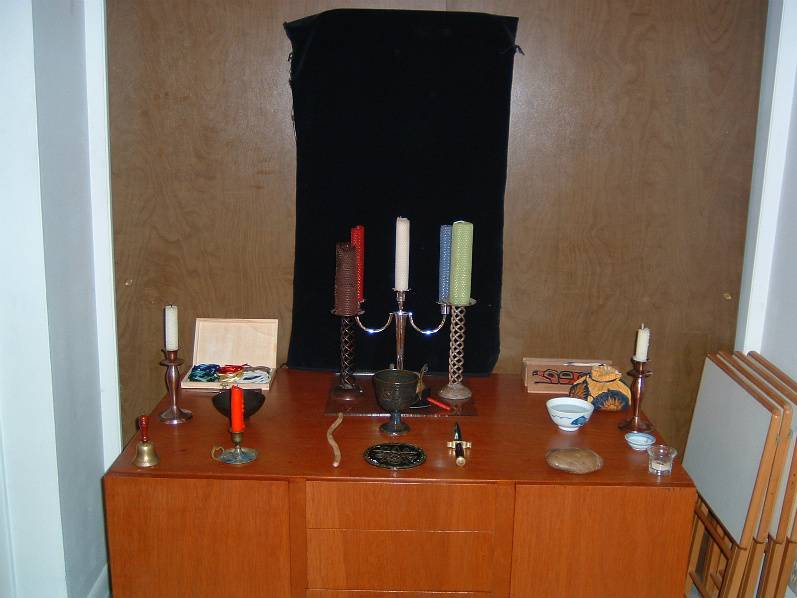
Contrarywise altar
Phanes has also previously taught an introductory class to paganism. The thirteen classes, all of which are two hours long and held about each month, cover information such as purification and meditation:
Some of it is ritual practices; some of it is spell work. It’s all modern pagan witchcraft, not general paganism, and it’s not a specific branch of the craft. I don’t care if you practice British traditional Wicca, your own homegrown traditions, or if you are being eclectic. The skill sets we’re teaching are usable [by all].
Between being a part of PNO, forming the ritual team, and teaching those who request it, Phanes has become a well-known and respected individual within the pagan community:
I’m a leader, perhaps. I have influence, not power. I lead by example, and that’s how good leadership works in the community. Anyone who tries to have power over others … that usually blows up and people leave. And, to a large degree, the more power you try to have, the less influence you have, because people won’t trust your motives. Most people really aren’t stupid.
Photos courtesy of Ian Phanes.
~~*~~








